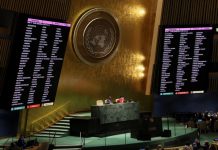
Key British MPs have questioned the UK government’s intent to keep Pakistan on the travel red list.
In a joint letter to the Secretary of State for Health and Social Care, key British MPs said that Pakistan understands the grave situation and that they are in contact with top officials from the country in order to gather details of the pandemic management.
The joint letter was authored by several focal persons: Chair and Co-chair of the APPG Pakistan, Yasmin Qureshi, and Rehman Chishti MP; other MPs include Debbie Abrahams, Tahir Ali, Apsana Begum, Liam Byrne, Andrew Gwynne, Afzal Khan, Sarah Owen, Naz Shah, Zarah Sultana, and Sam Tarry.
Afzal Khan, who is the Shadow Deputy Leader of the House of Commons, tweeted that “The Government’s decision is not rooted in science & fails to take into account recent developments..”
The parliamentarians have also asserted that the Government of Pakistan is willing to ensure that all data is regularly provided to the authorities.
The UK Government justified its inclusion of Pakistan in the red list on a scientific basis, asserting that Pakistan had also not shared updated data.
However, High Commissioner (HC) Moazzam Ahmad Khan said that all current data was provided.
He shared two weeks ago that “There is no communication gap, we are constantly in touch with them. In fact, I had an opportunity to speak to Prime Minister [Boris] Johnson and brought it to his attention that keeping Pakistan on the red list has left both people in Pakistan and the diaspora frustrated and disappointed.”
The top figures from 23rd August were also provided in the letter. Pakistan’s positivity rate reduced from 7.70% to 6.78%, while daily average cases declined from 4404 to 3629 which is a total reduction of 12 percent. The daily mortality rate also fell from 77 deaths to 74.
The MP’s also highlighted that the Pakistani diaspora in the UK has to unnecessarily suffer.
People are unable to meet their loved ones and family which has caused them distress. The Pakistani people are also extremely concerned over this matter as the delta variant originated from India, yet India was not included in the red list.
The joint letter suggested that people should be allowed to travel with negative PCR tests and WHO-approved vaccines. The arriving passenger could then be quarantined at home and tested until the end of their quarantine. The letter also emphasized that “keeping Pakistan on the red list is causing grievous suffering to many people.” They urged the UK government to consider their request to avoid a crisis.
While the UK has placed Pakistan on the travel list, Spain, Italy and Germany have not placed a travel ban on Pakistan. Germany has instead shared its concerns over India, from where the delta variant spread over.
Initially, the delta variant was called the Indian variant, but due to pressure from the Indian government, the name was changed to the Delta variant.
On the other hand, Pakistan proved itself in the pandemic. Its management has been applauded by top international organizations like the World Health Organisation (WHO).
Hence the Pakistani diaspora in the UK is also questioning why Pakistan is still on the red list.
Boris Johnson’s government to keep Pakistan on the red-list is being perceived as political pressure.
India has previously accepted its role in fermenting pressures on international bodies like the Financial Action Task Force (FATF) to keep Pakistan in the grey-list despite Pakistan’s serious efforts.





